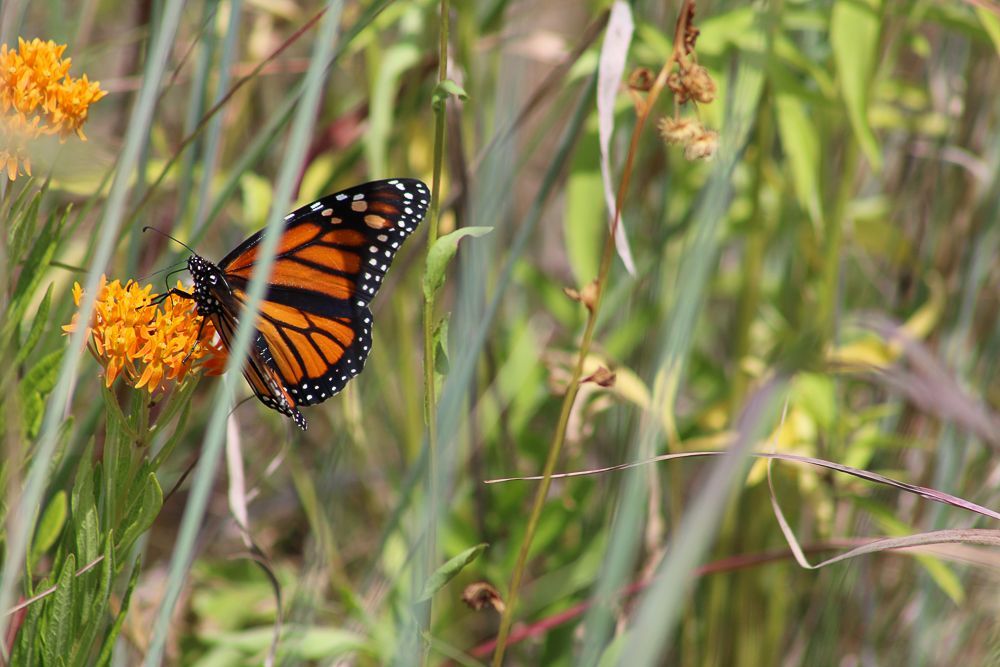FREE Wildlife and Pollinator Habitat Workshops
Looking to attract deer, songbirds, pheasants, and butterflies onto your property, while improving air, water, and soil quality? Come to a free workshop near you to learn about programs and tools available to help you create quality wildlife habitat on your property!
OR
Have you already enrolled in the State Acres for Wildlife Enhancement (SAFE) program? These workshops will help you gain a better understanding of the entire process. From application to technical planting and maintenance – we are here to help.
 Grassland habitats provide significant value to wildlife and to the citizens of Michigan. They provide filtration to water, collect carbon to help clean our air, and hold down the soil to prevent erosion. They also provide homes and food for a variety of wildlife including deer, songbirds, butterflies, turkeys, pheasants, and much more. Pollinators like bees and butterflies help to pollinate important agricultural crops.
Grassland habitats provide significant value to wildlife and to the citizens of Michigan. They provide filtration to water, collect carbon to help clean our air, and hold down the soil to prevent erosion. They also provide homes and food for a variety of wildlife including deer, songbirds, butterflies, turkeys, pheasants, and much more. Pollinators like bees and butterflies help to pollinate important agricultural crops.
Michigan United Conservation Clubs, the Department of Natural Resources, Farm Bill Biologists and many other partners, are holding a special habitat workshop series around the Lower Peninsula to provide landowners with information about how to plant, manage, and fund grassland habitats on private land.
These workshops are hosted in part by the Michigan Pheasant Restoration Initiative (MPRI) Coalition. The MPRI is a conservation initiative to restore and enhance Michigan pheasant habitat, populations, and hunting opportunities on private and public lands via pheasant cooperatives. The MPRI works by acquiring state and federal resources to assist landowners in the cooperatives to improve wildlife habitat on their properties and by improving habitat on selected state game areas, recreation areas, or other public lands.
Local Workshops
- Lenawee County: Thursday, March 28 @ 6 PM, Artesian Wells Sports Tavern, 18711 US-12, Cement City, MI 49233
- Branch County: Thursday, April 4 @ 7 PM, Coldwater Township Hall, 319 Sprague Rd, Coldwater, MI 49036
- Lapeer County: Tuesday, April 9 @ 6 PM, Pheasant Ridge Hunt Club, 7677 Martin Rd, Imlay City, MI 48444
- Gratiot County: Wednesday, April 10 @ 5 PM, RESD Building, 1131 E Center St, Ithaca, MI
- Tuscola County: Thursday, April 11 @ 6 PM, Brentwood, 178 Park Drive, Caro, MI 48723
For event specific information please find your respective host county below:
- Tuscola & Huron Counties: 989-673-8171 ext. 3
- Lenawee, Hillsdale & Monroe Counties: 517-263-7400 ext. 3
- Gratiot, Clinton & Saginaw Counties: 989-875-3900 ext. 3
- Sanilac, St. Clair & Lapeer Counties: 810-648-2998 ext. 3140
- Branch County Conservation District: 517-278-2725 ext 3
- Genesee County Conservation District: 810-230-8766 ext. 3
- Shiawassee County Conservation District: 989-723-8263 ext. 3
If you have questions about registering please contact Morgan Warda at mwarda@mucc.org or 517-346-6454.
For more information about the Michigan Pheasant Restoration Initiative, visit www.michigan.gov/pheasant.
The Michigan Department of Natural Resources is committed to the conservation, protection, management, use and enjoyment of the state’s natural and cultural resources for current and future generations. For more information, go to www.michigan.gov/dnr.
The post FREE Wildlife and Pollinator Habitat Workshops appeared first on Michigan United Conservation Clubs.
Recent Posts



